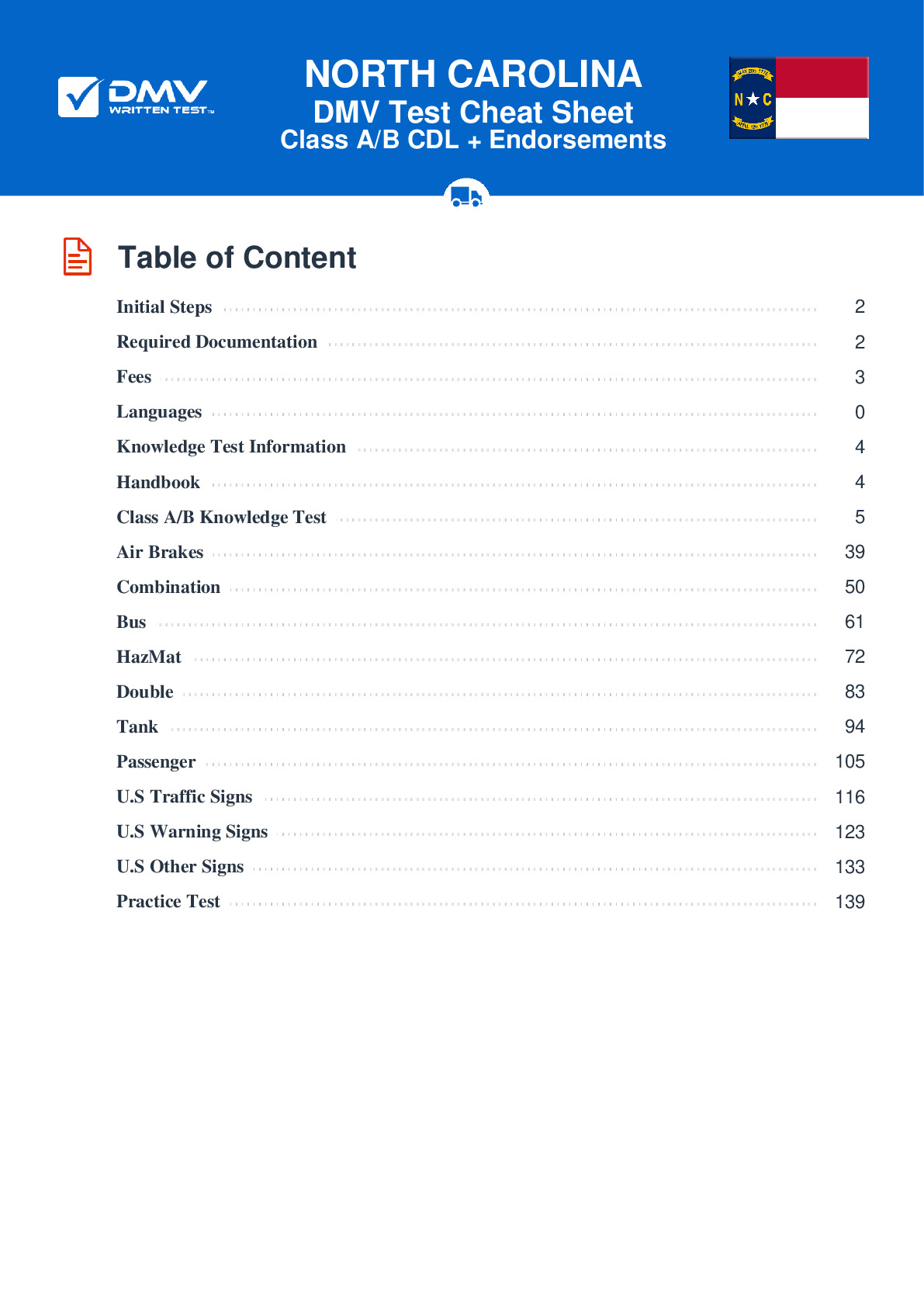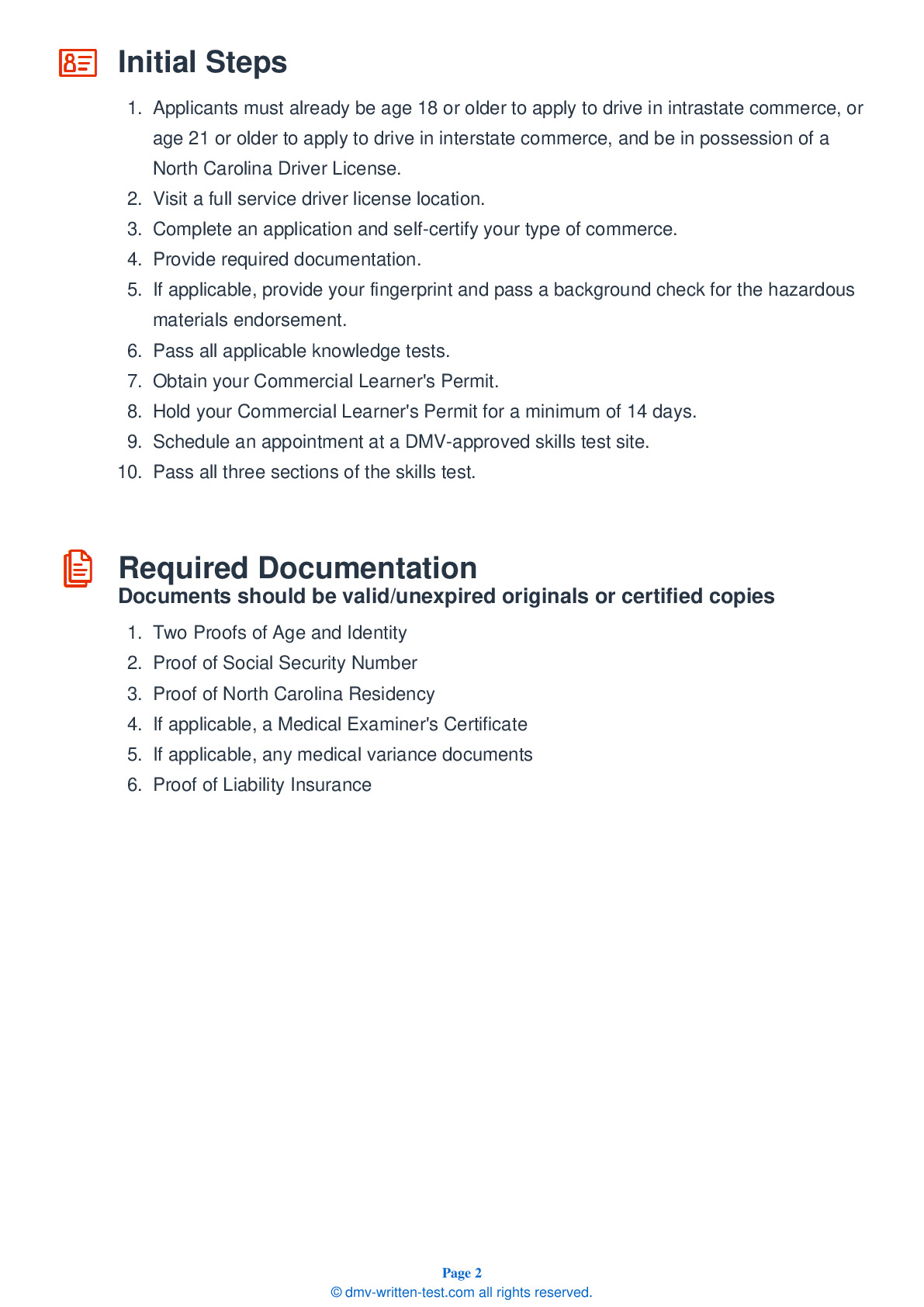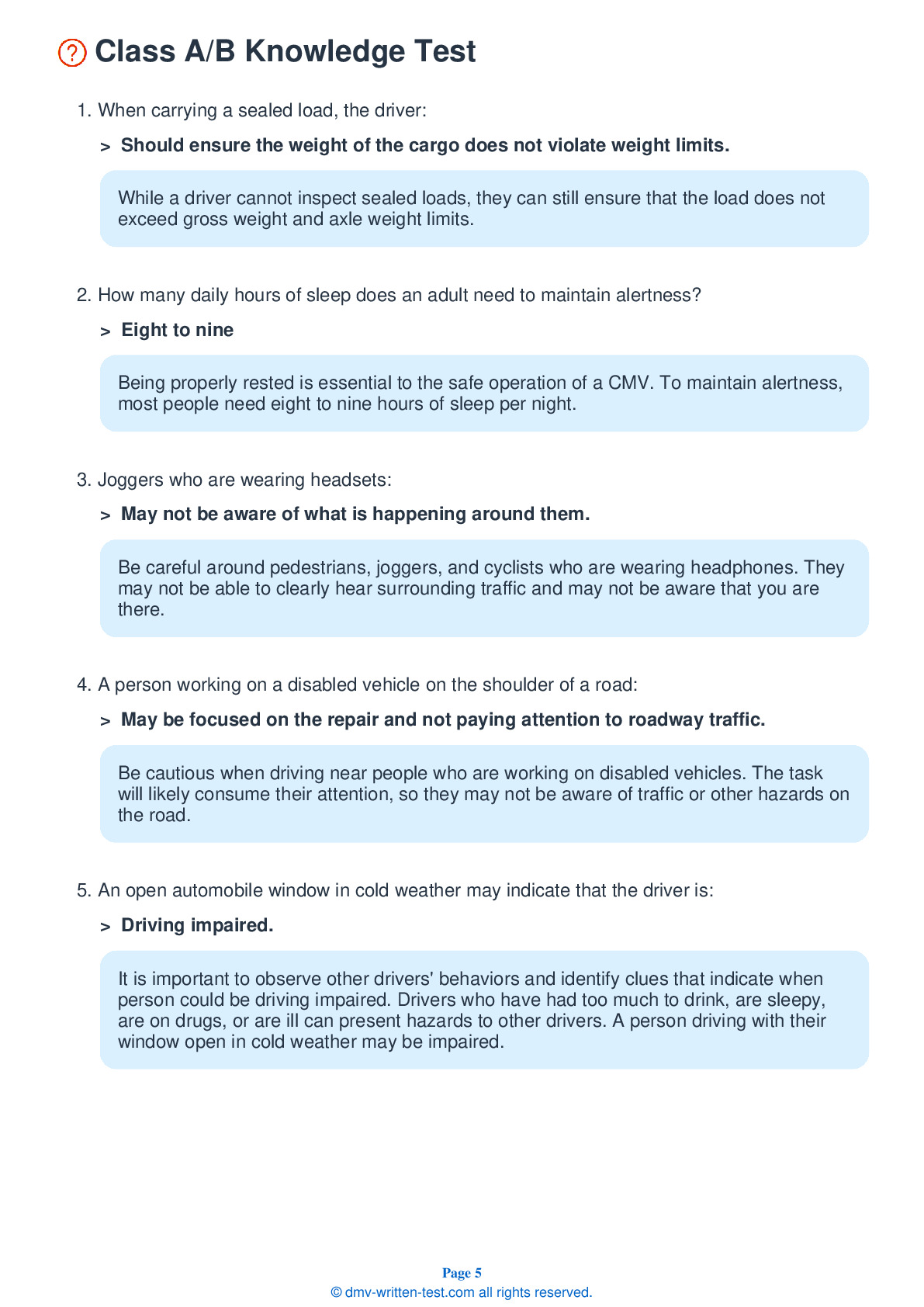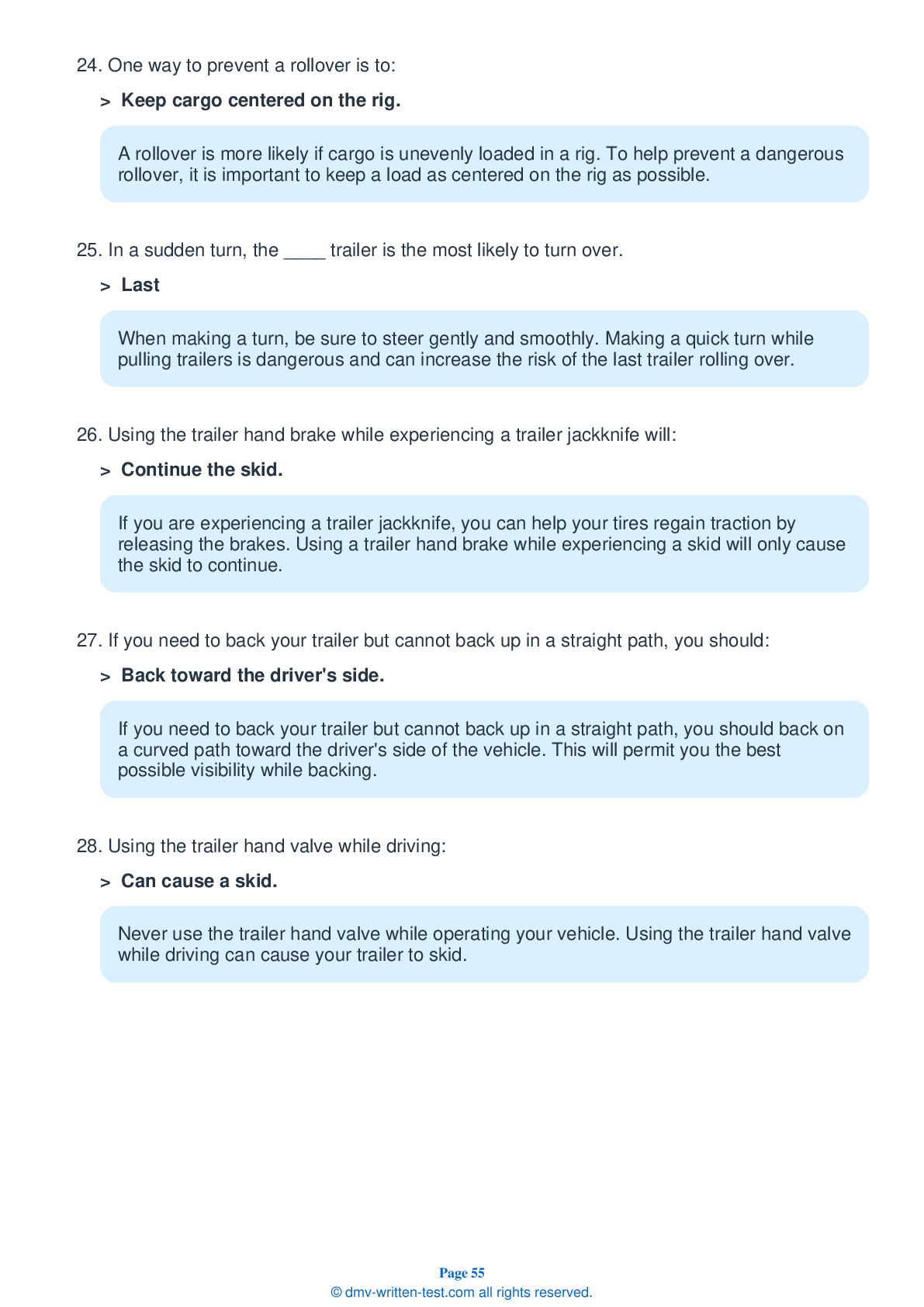Passenger
To receive this endorsement, applicants must pass a test consisting of 20 multiple choice questions. Each question has three or four answer choices. To pass, the applicant must answer at least 16 questions correctly. Test questions come from the North Carolina Commercial Driver License Manual. Questions come from chapters covering: Driving Safely, Transporting Passengers Safely, Pre-Trip Vehicle Inspection Test, Basic Vehicle Control Skills Test and On-Road Driving. The Passenger endorsement can be used with the Class A, B or C CDL.
Number of Question
Passing Score
15. Looking far ahead of your vehicle while driving is:
Explanation
Good drivers look down the road at least 12 to 15 seconds ahead of their vehicles. This makes it possible to identify hazards early, when drivers are more likely to have time to respond appropriately.
16. Regrooved tires:
Explanation
Regrooved, recapped, or retreaded tires are prohibited on the front wheels of a bus.
17. When traveling down a hill, you can reduce the amount of required braking by:
Explanation
Before starting down a hill, decelerate and shift down into a gear that will allow you to control your vehicle without braking too hard. Using too much brake when driving downhill can cause the brakes to overheat, reducing the braking power.
18. If the coolant temperature gauge goes above the highest safe temperature, you should:
Explanation
If the coolant temperature gauge goes above the highest safe temperature, you should stop driving as soon as possible and try to figure out what is wrong. There could be an issue in your vehicle that could lead to engine failure and possibly a fire.
19. Mirror adjustment can only be checked properly if:
Explanation
On a vehicle with one or more trailers, mirror adjustment can only be checked accurately if the trailers are straight. Mirror adjustment should be checked before the start of every trip.
20. When backing with a trailer:
Explanation
When backing, you should pull forward to reposition your vehicle whenever needed. Drift should be corrected immediately by turning the steering wheel in the direction of the drift.
Frequently Asked Questions
To obtain a CDL passenger endorsement in North Carolina, you must follow these steps:
1. Obtain a North Carolina commercial driver's license (CDL) by passing the required knowledge and skills tests and meeting all other eligibility requirements.
2. Complete a CDL passenger endorsement application form, which can be obtained from any North Carolina Division of Motor Vehicles (DMV) office or downloaded from the DMV website.
3. Pay the required fee for the passenger endorsement, which is currently $10.
4. Pass the CDL passenger endorsement knowledge test, which covers topics such as loading and unloading passengers, emergency procedures, and passenger safety.
5. Pass a skills test in a vehicle that requires a passenger endorsement. This test evaluates your ability to operate a commercial vehicle that is designed to transport passengers safely and efficiently.
Note that you must have a valid medical certificate and meet other eligibility requirements to obtain a CDL passenger endorsement in North Carolina. Additionally, you may be required to undergo additional training or meet other state-specific requirements depending on your driving experience and the type of vehicle you will be driving.
1. Obtain a North Carolina commercial driver's license (CDL) by passing the required knowledge and skills tests and meeting all other eligibility requirements.
2. Complete a CDL passenger endorsement application form, which can be obtained from any North Carolina Division of Motor Vehicles (DMV) office or downloaded from the DMV website.
3. Pay the required fee for the passenger endorsement, which is currently $10.
4. Pass the CDL passenger endorsement knowledge test, which covers topics such as loading and unloading passengers, emergency procedures, and passenger safety.
5. Pass a skills test in a vehicle that requires a passenger endorsement. This test evaluates your ability to operate a commercial vehicle that is designed to transport passengers safely and efficiently.
Note that you must have a valid medical certificate and meet other eligibility requirements to obtain a CDL passenger endorsement in North Carolina. Additionally, you may be required to undergo additional training or meet other state-specific requirements depending on your driving experience and the type of vehicle you will be driving.
To obtain a CDL passenger license (also known as a CDL with a passenger endorsement) in North Carolina, you must meet the following requirements:
1. Age: You must be at least 18 years old to drive within North Carolina and at least 21 years old to drive across state lines or transport hazardous materials.
2. Valid driver's license: You must hold a valid North Carolina driver's license or an equivalent driver's license from another state.
3. Medical certification: You must pass a medical examination and obtain a valid medical certificate from a certified medical examiner.
4. CDL permit: You must obtain a Commercial Learner's Permit (CLP) by passing the required knowledge tests for the type of commercial vehicle you plan to operate. You must hold your CLP for at least 14 days before taking your skills test.
5. Skills test: You must pass a skills test in a vehicle that requires a passenger endorsement. This test evaluates your ability to operate a commercial vehicle that is designed to transport passengers safely and efficiently.
6. Passenger endorsement knowledge test: You must pass the CDL passenger endorsement knowledge test, which covers topics such as loading and unloading passengers, emergency procedures, and passenger safety.
7. Background check: You must undergo a criminal background check, which includes fingerprinting.
Note that additional requirements may apply depending on your driving experience and the type of vehicle you plan to operate.
1. Age: You must be at least 18 years old to drive within North Carolina and at least 21 years old to drive across state lines or transport hazardous materials.
2. Valid driver's license: You must hold a valid North Carolina driver's license or an equivalent driver's license from another state.
3. Medical certification: You must pass a medical examination and obtain a valid medical certificate from a certified medical examiner.
4. CDL permit: You must obtain a Commercial Learner's Permit (CLP) by passing the required knowledge tests for the type of commercial vehicle you plan to operate. You must hold your CLP for at least 14 days before taking your skills test.
5. Skills test: You must pass a skills test in a vehicle that requires a passenger endorsement. This test evaluates your ability to operate a commercial vehicle that is designed to transport passengers safely and efficiently.
6. Passenger endorsement knowledge test: You must pass the CDL passenger endorsement knowledge test, which covers topics such as loading and unloading passengers, emergency procedures, and passenger safety.
7. Background check: You must undergo a criminal background check, which includes fingerprinting.
Note that additional requirements may apply depending on your driving experience and the type of vehicle you plan to operate.
Yes, you may need specific experience or training to obtain a CDL passenger endorsement in North Carolina. The type of training and experience required depends on the type of vehicle you plan to operate.
For example, if you plan to operate a bus that can transport 16 or more passengers, you must complete a training course that meets the Federal Motor Carrier Safety Administration's (FMCSA) requirements. The training course must be approved by the FMCSA and cover topics such as passenger safety, trip planning, and defensive driving.
In addition, if you plan to operate a vehicle that requires a CDL with a passenger endorsement, you must have experience operating the type of vehicle you plan to drive. This experience requirement can be met through previous employment or by completing a training course that includes behind-the-wheel experience.
It's important to note that North Carolina has additional requirements for school bus drivers. School bus drivers must complete a specialized training course and obtain a School Bus Driver Certificate in addition to their CDL with a passenger endorsement.
Overall, it's important to research the specific requirements for the type of vehicle you plan to operate and ensure that you meet all necessary training and experience requirements before applying for your CDL passenger endorsement in North Carolina.
For example, if you plan to operate a bus that can transport 16 or more passengers, you must complete a training course that meets the Federal Motor Carrier Safety Administration's (FMCSA) requirements. The training course must be approved by the FMCSA and cover topics such as passenger safety, trip planning, and defensive driving.
In addition, if you plan to operate a vehicle that requires a CDL with a passenger endorsement, you must have experience operating the type of vehicle you plan to drive. This experience requirement can be met through previous employment or by completing a training course that includes behind-the-wheel experience.
It's important to note that North Carolina has additional requirements for school bus drivers. School bus drivers must complete a specialized training course and obtain a School Bus Driver Certificate in addition to their CDL with a passenger endorsement.
Overall, it's important to research the specific requirements for the type of vehicle you plan to operate and ensure that you meet all necessary training and experience requirements before applying for your CDL passenger endorsement in North Carolina.
Yes, there is an additional written test or exam that you must pass to obtain a CDL passenger endorsement in North Carolina. The test is called the Passenger Transport Endorsement Test and includes questions related to safely transporting passengers, loading and unloading passengers, emergency procedures, and other topics related to passenger transportation.
To take the Passenger Transport Endorsement Test, you must first pass the general knowledge test for a commercial driver's license (CDL) and obtain a Commercial Learner's Permit (CLP). You must also pass a skills test in a vehicle designed to transport passengers before you can take the Passenger Transport Endorsement Test.
The Passenger Transport Endorsement Test is a multiple-choice exam that typically consists of 20 to 30 questions. You must answer at least 16 questions correctly to pass the test.
It's important to study the North Carolina Commercial Driver's License Handbook and any other materials recommended by your training program or instructor to prepare for the Passenger Transport Endorsement Test. You can also take practice tests online or through commercial study materials to help you prepare for the exam.
To take the Passenger Transport Endorsement Test, you must first pass the general knowledge test for a commercial driver's license (CDL) and obtain a Commercial Learner's Permit (CLP). You must also pass a skills test in a vehicle designed to transport passengers before you can take the Passenger Transport Endorsement Test.
The Passenger Transport Endorsement Test is a multiple-choice exam that typically consists of 20 to 30 questions. You must answer at least 16 questions correctly to pass the test.
It's important to study the North Carolina Commercial Driver's License Handbook and any other materials recommended by your training program or instructor to prepare for the Passenger Transport Endorsement Test. You can also take practice tests online or through commercial study materials to help you prepare for the exam.
Yes, there are specific skills and maneuvers that you will need to demonstrate during the CDL Passenger endorsement skills test in North Carolina. The skills test is designed to evaluate your ability to safely operate a vehicle designed to transport passengers.
During the skills test, you will be evaluated on your ability to perform the following maneuvers:
1. Pre-trip inspection: You will need to perform a thorough pre-trip inspection of your vehicle and explain the process to the examiner.
2. Basic vehicle control: You will need to demonstrate your ability to control the vehicle in a controlled and safe manner. This includes backing up, turning, and parking.
3. On-road driving: You will need to demonstrate your ability to safely operate the vehicle on public roads, following traffic laws and signals, and responding appropriately to other drivers and pedestrians.
4. Loading and unloading: You will need to demonstrate proper procedures for loading and unloading passengers, including use of the vehicle's equipment such as wheelchair lifts or ramps.
5. Emergency procedures: You will need to demonstrate your ability to respond appropriately in emergency situations such as brake failure or tire blowouts.
It's important to note that North Carolina has additional requirements for school bus drivers. School bus drivers must also demonstrate proficiency in loading and unloading students, using stop-arm and crossing gate signals, and other procedures specific to school transportation.
It's important to practice these skills with a qualified instructor or training program before taking the skills test for your CDL Passenger endorsement in North Carolina.
During the skills test, you will be evaluated on your ability to perform the following maneuvers:
1. Pre-trip inspection: You will need to perform a thorough pre-trip inspection of your vehicle and explain the process to the examiner.
2. Basic vehicle control: You will need to demonstrate your ability to control the vehicle in a controlled and safe manner. This includes backing up, turning, and parking.
3. On-road driving: You will need to demonstrate your ability to safely operate the vehicle on public roads, following traffic laws and signals, and responding appropriately to other drivers and pedestrians.
4. Loading and unloading: You will need to demonstrate proper procedures for loading and unloading passengers, including use of the vehicle's equipment such as wheelchair lifts or ramps.
5. Emergency procedures: You will need to demonstrate your ability to respond appropriately in emergency situations such as brake failure or tire blowouts.
It's important to note that North Carolina has additional requirements for school bus drivers. School bus drivers must also demonstrate proficiency in loading and unloading students, using stop-arm and crossing gate signals, and other procedures specific to school transportation.
It's important to practice these skills with a qualified instructor or training program before taking the skills test for your CDL Passenger endorsement in North Carolina.
No, you cannot transport passengers without a CDL Passenger endorsement if you are operating a vehicle designed to transport more than 15 passengers, including the driver, or a vehicle that requires hazardous materials placards.
In North Carolina, a CDL Passenger endorsement is required for drivers who operate vehicles designed to transport passengers such as buses, vans, taxis, and limousines. The endorsement indicates that the driver has the knowledge and skills necessary to safely transport passengers.
Driving without the required endorsement could result in fines, penalties, and legal action. Additionally, if you are involved in an accident while transporting passengers without the proper endorsement, you could be held liable for any damages or injuries that occur.
It's important to obtain the necessary endorsements and follow all applicable rules and regulations to ensure the safety of yourself and your passengers.
In North Carolina, a CDL Passenger endorsement is required for drivers who operate vehicles designed to transport passengers such as buses, vans, taxis, and limousines. The endorsement indicates that the driver has the knowledge and skills necessary to safely transport passengers.
Driving without the required endorsement could result in fines, penalties, and legal action. Additionally, if you are involved in an accident while transporting passengers without the proper endorsement, you could be held liable for any damages or injuries that occur.
It's important to obtain the necessary endorsements and follow all applicable rules and regulations to ensure the safety of yourself and your passengers.
You can add the CDL Passenger endorsement to your existing CDL license in North Carolina by passing the required knowledge and skills tests for the endorsement. You do not need to apply for a new license.
To add the Passenger endorsement to your CDL license, you will need to pass the Passenger endorsement written test and the Passenger endorsement skills test. The written test covers topics such as passenger safety, loading and unloading procedures, and emergency response. The skills test evaluates your ability to safely operate a vehicle designed to transport passengers.
Before taking the tests, you must meet certain eligibility requirements, including having a valid CDL license and passing a medical examination. You may also need to complete additional training specific to passenger transportation.
Once you have passed both tests, you can apply for the Passenger endorsement to be added to your CDL license. There may be additional fees for adding the endorsement.
It's important to note that if you have any driving violations or medical conditions that could impact your ability to safely operate a vehicle, you may not be eligible for the Passenger endorsement or may require additional testing or certification.
To add the Passenger endorsement to your CDL license, you will need to pass the Passenger endorsement written test and the Passenger endorsement skills test. The written test covers topics such as passenger safety, loading and unloading procedures, and emergency response. The skills test evaluates your ability to safely operate a vehicle designed to transport passengers.
Before taking the tests, you must meet certain eligibility requirements, including having a valid CDL license and passing a medical examination. You may also need to complete additional training specific to passenger transportation.
Once you have passed both tests, you can apply for the Passenger endorsement to be added to your CDL license. There may be additional fees for adding the endorsement.
It's important to note that if you have any driving violations or medical conditions that could impact your ability to safely operate a vehicle, you may not be eligible for the Passenger endorsement or may require additional testing or certification.
Yes, there are restrictions and limitations for drivers with a CDL Passenger endorsement in North Carolina. These restrictions and limitations are in place to ensure the safety of passengers and other drivers on the road.
Some of the restrictions and limitations for drivers with a CDL Passenger endorsement include:
1. Vehicle size and weight: Drivers with a Passenger endorsement are limited to operating vehicles that are designed to transport 16 or more passengers, including the driver, and weigh less than 26,001 pounds.
2. Endorsement-specific restrictions: Depending on the specific endorsement, there may be additional restrictions related to the type of vehicle that can be operated or the type of cargo that can be transported.
3. Passenger safety: Drivers with a Passenger endorsement must follow specific safety protocols for passenger transportation, including proper loading and unloading procedures, ensuring seat belts are used, and following emergency response procedures.
4. Medical requirements: Drivers with a Passenger endorsement must meet certain medical requirements, including passing a medical examination every two years.
It's important to follow all restrictions and limitations associated with your CDL Passenger endorsement to ensure the safety of yourself, your passengers, and other drivers on the road. Failure to follow these restrictions may result in fines, penalties, or suspension of your CDL license.
Some of the restrictions and limitations for drivers with a CDL Passenger endorsement include:
1. Vehicle size and weight: Drivers with a Passenger endorsement are limited to operating vehicles that are designed to transport 16 or more passengers, including the driver, and weigh less than 26,001 pounds.
2. Endorsement-specific restrictions: Depending on the specific endorsement, there may be additional restrictions related to the type of vehicle that can be operated or the type of cargo that can be transported.
3. Passenger safety: Drivers with a Passenger endorsement must follow specific safety protocols for passenger transportation, including proper loading and unloading procedures, ensuring seat belts are used, and following emergency response procedures.
4. Medical requirements: Drivers with a Passenger endorsement must meet certain medical requirements, including passing a medical examination every two years.
It's important to follow all restrictions and limitations associated with your CDL Passenger endorsement to ensure the safety of yourself, your passengers, and other drivers on the road. Failure to follow these restrictions may result in fines, penalties, or suspension of your CDL license.
Yes, there are age requirements and restrictions for obtaining a CDL Passenger endorsement in North Carolina.
To obtain a CDL Passenger endorsement, you must be at least 18 years old and hold a valid North Carolina Class A, B, or C commercial driver's license. However, if you plan to operate a vehicle that is designed to transport passengers across state lines or internationally, you must be at least 21 years old.
In addition to age requirements, there are also certain medical requirements that must be met to obtain a CDL Passenger endorsement. You must pass a medical examination and meet all federal and state requirements for commercial drivers.
It's important to note that if you have any driving violations or medical conditions that could impact your ability to safely operate a vehicle, you may not be eligible for the Passenger endorsement or may require additional testing or certification.
To obtain a CDL Passenger endorsement, you must be at least 18 years old and hold a valid North Carolina Class A, B, or C commercial driver's license. However, if you plan to operate a vehicle that is designed to transport passengers across state lines or internationally, you must be at least 21 years old.
In addition to age requirements, there are also certain medical requirements that must be met to obtain a CDL Passenger endorsement. You must pass a medical examination and meet all federal and state requirements for commercial drivers.
It's important to note that if you have any driving violations or medical conditions that could impact your ability to safely operate a vehicle, you may not be eligible for the Passenger endorsement or may require additional testing or certification.
With a CDL Passenger endorsement, you can operate a variety of vehicles that are designed to transport passengers. The specific types of vehicles you can operate depend on the class of commercial driver's license you hold and the specific endorsement you have.
In general, drivers with a CDL Passenger endorsement can operate vehicles that are designed to transport 16 or more passengers, including the driver. This includes vehicles such as:
1. Buses: This includes school buses, transit buses, and other types of buses designed to transport large numbers of passengers.
2. Vans: This includes passenger vans, shuttle vans, and other types of vans designed to transport groups of people.
3. Limousines: This includes stretch limousines and other luxury vehicles designed for private transportation.
However, it's important to note that there may be additional requirements or restrictions based on the specific type of vehicle you plan to operate or the specific endorsement you hold. For example, if you have a School Bus endorsement, you may only be able to operate school buses and may be required to undergo additional training and certification.
Before operating any vehicle with a CDL Passenger endorsement, make sure you understand all of the requirements and restrictions associated with your license and endorsement.
In general, drivers with a CDL Passenger endorsement can operate vehicles that are designed to transport 16 or more passengers, including the driver. This includes vehicles such as:
1. Buses: This includes school buses, transit buses, and other types of buses designed to transport large numbers of passengers.
2. Vans: This includes passenger vans, shuttle vans, and other types of vans designed to transport groups of people.
3. Limousines: This includes stretch limousines and other luxury vehicles designed for private transportation.
However, it's important to note that there may be additional requirements or restrictions based on the specific type of vehicle you plan to operate or the specific endorsement you hold. For example, if you have a School Bus endorsement, you may only be able to operate school buses and may be required to undergo additional training and certification.
Before operating any vehicle with a CDL Passenger endorsement, make sure you understand all of the requirements and restrictions associated with your license and endorsement.




